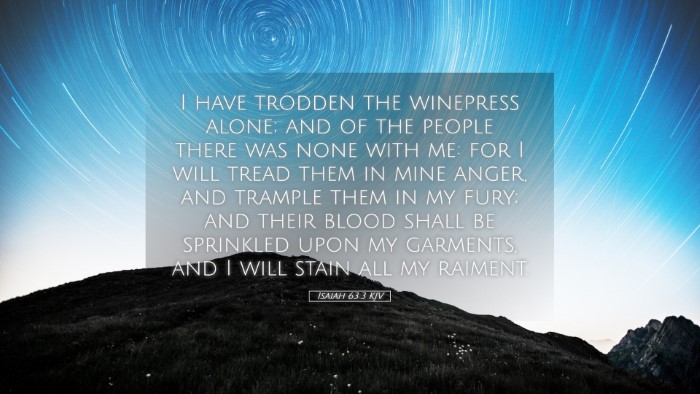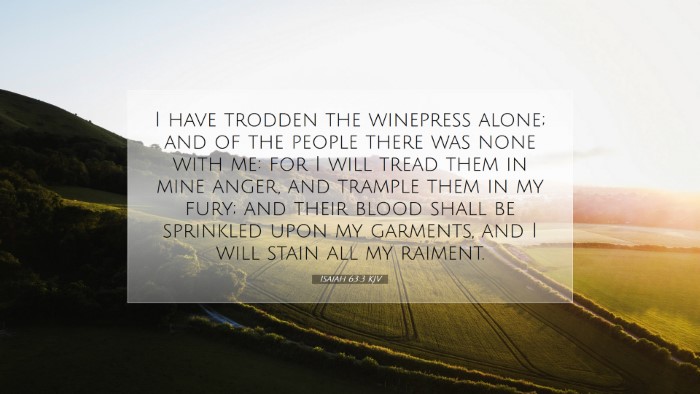Isaiah 63:3 Commentary
Verse: "I have trodden the winepress alone; and of the people there was none with me: for I will tread them in mine anger, and trample them in my fury, and their blood shall be sprinkled upon my garments, and I will stain all my raiment."
Introduction
Isaiah 63:3 presents a vivid picture of the Lord's judgment against His enemies, symbolically depicted as the act of treading the winepress. This verse encapsulates profound themes of divine justice, anger, and the singularity of God’s action in delivering His people while executing judgment. Both a source of comfort and a warning, this verse calls for deep reflection from pastors, students, and scholars of theology.
Theological Significance
The metaphor of the winepress signifies a deep, forceful action. The act of treading grapes not only indicates extraction of juice but symbolizes the overflowing wrath of God upon sin and rebellion. As noted by Matthew Henry, this imagery highlights the solitary nature of Christ's suffering and the comprehensive judgment He inflicts upon the wicked.
Albert Barnes also points out that the phrase "alone" emphasizes the lack of assistance or support in God's judgment. This indicates God's sovereign authority and the assured execution of His will without reliance on human intervention or support.
In examining this verse, we see the duality of God’s character: He is both a refuge for the oppressed and a righteous judge against the unrepentant sinner, as Adam Clarke elaborately explains. God's fury is not capricious but arises from His holiness and regard for justice.
Contextual Analysis
Historical Context: The book of Isaiah is set against the backdrop of Israel's struggle with sin, judgement, and redemption. The prophecy implies not just a future judgment, but reflects the continuing consequences of Israel's disobedience. The original audience would understand these verses in light of their covenant relationship with God, recognizing their need for repentance and the seriousness of divine judgment.
Linguistic Elements: The Hebrew words used in this verse carry connotations of intensity and singularity. The word for "tread" suggests aggressive action, while "anger" and "fury" indicate deep emotional involvement. This suggests that the judgment is not merely a mechanical process but involves personal engagement from God.
Interpretive Insights
- God's Judgment: This verse reveals God's readiness to judge sin while emphasizing that divine wrath is just and necessary.
- The Role of the Messiah: The solitary imagery foreshadows the sufferings of Jesus Christ, who bore the full weight of sin alone during His crucifixion.
- Symbolism of Blood: The allusion to blood on His garments represents the severity and irrevocability of judgment, alluding to the sacrificial system and the price of redemption.
- Hope for the Faithful: While the verse depicts a grim reality for the unrepentant, it also reassures believers of God's commitment to redeeming justice.
Application for Today
Implications for Preaching: This text provides a compelling basis for sermons addressing the seriousness of sin and the holiness of God. Pastors are encouraged to emphasize God's righteous judgment while also articulating the hope found in Christ's atoning work.
Call to Repentance: For contemporary believers, Isaiah 63:3 serves as an urgent reminder of the reality of divine judgement upon sin. It invites all to reflect on their walk with God and return to Him in sincere repentance.
The Nature of God: It challenges believers to reconcile the dual nature of God's character – His love for His people and His righteous anger against sin. Understanding this can foster a deeper appreciation for grace and mercy.
Conclusion
Isaiah 63:3 serves as a poignant reminder of God's righteousness, the weight of sin, and the necessity of Christ’s sacrificial love. By combining insights from respected commentaries, we gain rich understanding applicable to our spiritual journeys and ministries. This verse is potent with theological depth, urging us to recognize the seriousness of God's judgment while clinging to the hope of redemption through Christ.


